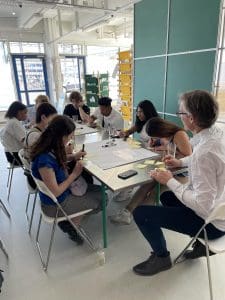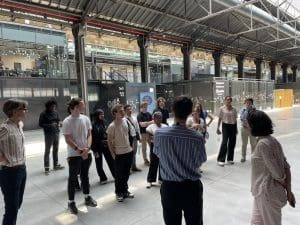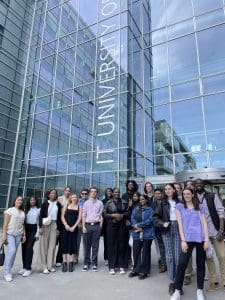Seated around tables filled with yellow Post-it notes and pens, nearly 20 students from Syracuse University pondered technology on a global level. How could emerging technologies protect and restore nature in the future? They thoughtfully scribbled answers and shared solutions.
This scene played out at SPACE10, one of the many stops on the iSchool’s EuroTech trip, which wrapped up earlier this month. Led by Professor Carsten Østerlund, the fast-paced seminar took students to 10 cities in seven countries in two and a half weeks. The 3-credit course allowed students to see technologies in action at some of the most successful organizations in the world.
By plane, train and ferry, students traveled through Norway, Denmark, Sweden, Germany, France, Belgium, and Italy in late May and early June. Immersing themselves in global culture, they visited innovative companies and networked with professionals to see how they use technology, information and data to drive their businesses and address global technology challenges.
Innovative Design for Environmental Issues

Students collaborate on innovative idea to solve climate change at Space10 headquarters in Copenhagen.
At SPACE10 in Copenhagen, Denmark, students learned about the company’s unique business model and passion for research, design and culture. Funded by IKEA, the well-known furniture and home goods store, SPACE10 is an independent research and design lab. Its core mission is to create a better everyday life for people and the planet.
From climate change and food insecurity to urbanization and resource scarcity, students learned about some of the company’s top research priorities. Students also had the chance to discuss sustainability, deforestation and other major issues during their visit, and were encouraged to be creative and discuss innovative solutions to global environmental issues.
While being immersed in the culture of some of the most fascinating cities in Europe, students also visited start-up tech companies and learned about sustainability in the technology sector.
A Redeveloped Hub for the Arts
In addition to visiting tech companies, students experienced innovation in creative fields, such as entertainment and visual and performing arts.

Deep in discussion at OGR Torino, a tech startup in Italy.
In northern Italy, students visited OGR Torino, a 20,000-square-meter building constructed in the late 1800s for the maintenance of railway vehicles. Now, the H-shaped building is used for innovation in visual and performing arts. Students learned how the OGR – Officine Grandi Riparazioni – industrial complex drove the town’s growth for more than 100 years.
For years, the building was left abandoned and faced closure and demolition. Finally, in 2013, OGR Torino was purchased and redeveloped to become a hub for arts, entertainment and culture, which the students saw firsthand during their trip.
Fellow Students Focused on IT Research

Students visiting IT University of Copenhagen.
From one college to another, Syracuse University students visited IT University of Copenhagen, where they had the opportunity to meet with fellow students who share common interests in technology solutions and sustainability.
Established in 1999, ITU is Denmark’s leading university focusing on IT research and education. The college offers state-of-the-art teaching and research for computer science, business IT and digital design.
At ITU, Syracuse students heard presentations from Mette Stefension, a representative from Accenture, and Thomas Mardahl, a founder of Rejoose, both of whom highlighted the immense potential that can be found in the intersection of sustainability and information technology.
EuroTech Trip Memories
From the first day in Oslo, Norway, where Syracuse students kicked off the EuroTech trip, to their final day in Europe, the students collected more than sightseeing trinkets. In notes to their professor, the students shared their thoughts about the trip and how experiencing problem-solving on a global stage will stick with them long after they come home.
From shared meals to shared business solutions, the students experienced first-hand how technology and information can work together for global enterprise and the common good.
